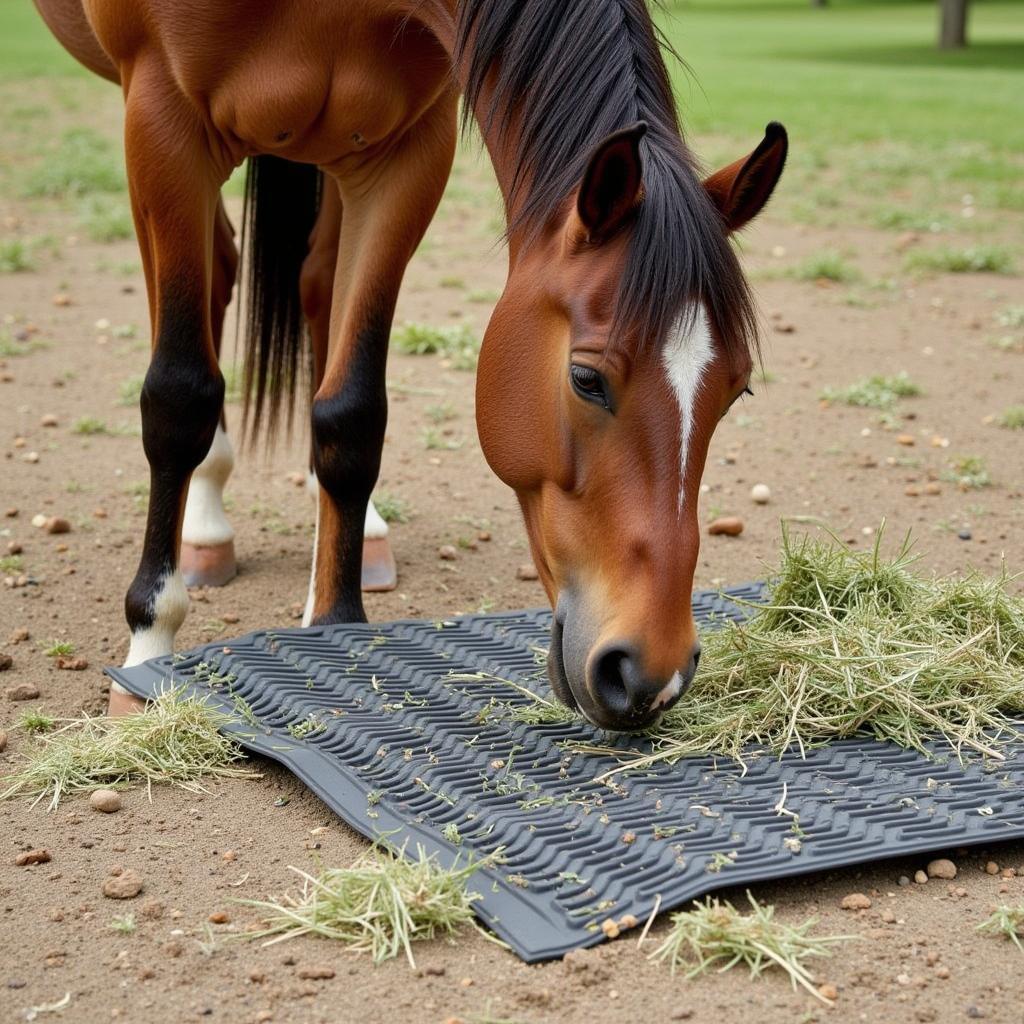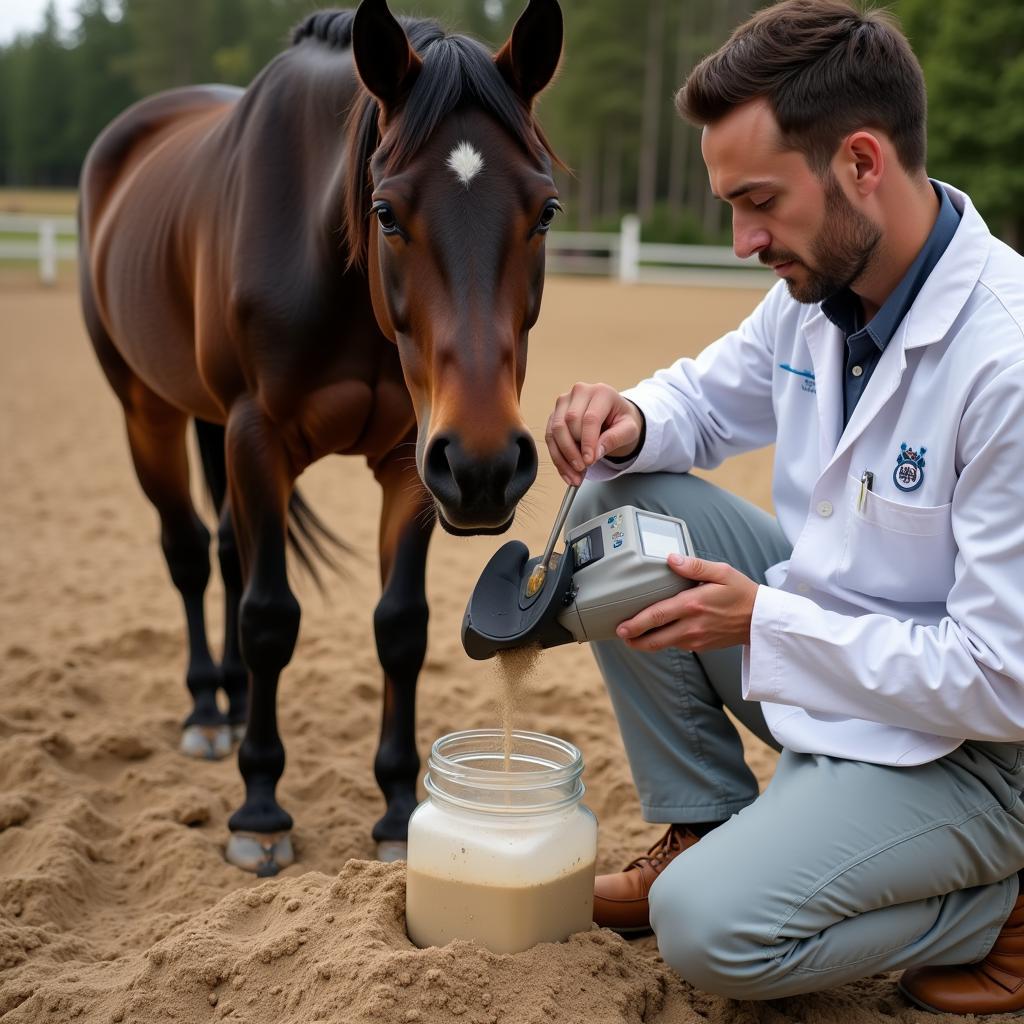Sand Purge For Horses, also known as sand clearing, is a crucial aspect of equine health, especially for those living in sandy environments. Horses may ingest sand accidentally while grazing or eating from the ground, leading to accumulation in their digestive tracts. This accumulation can cause a range of health problems, making it vital for horse owners to understand, prevent, and address sand purge effectively.
The Hidden Dangers of Sand Accumulation in Horses
While a small amount of sand might pass through the digestive system harmlessly, significant accumulation can wreak havoc on a horse’s health. The abrasive nature of sand can irritate the lining of the intestines, leading to discomfort, weight loss, and even colic.
 Horse suffering from sand colic
Horse suffering from sand colic
Here’s how sand accumulation can impact your horse:
- Colic: This is the most common and often most severe consequence of sand accumulation. Sand can create blockages in the intestines, causing severe abdominal pain, and may even require surgical intervention.
- Weight Loss: As sand irritates the digestive tract, it can interfere with nutrient absorption. This can lead to weight loss, even if the horse maintains a normal appetite.
- Diarrhea: The irritation caused by sand can disrupt the digestive process, leading to loose stools or diarrhea. This can further contribute to dehydration and weakness.
- Lethargy and Depression: Horses with sand accumulation often exhibit signs of lethargy, depression, and a general lack of energy due to discomfort and potential malnutrition.
Preventing Sand Ingestion: Proactive Measures for Equine Health
Prevention is always better than cure, and this holds especially true when it comes to sand accumulation in horses. By taking proactive steps, you can significantly reduce the risk of your equine companion suffering from sand-related health issues.
- Feeding Practices: Avoid feeding horses directly on sandy ground. Use feeding mats, tubs, or elevated feeders to minimize sand intake during meals.
- Grazing Management: Fence off areas with sparse vegetation and exposed sand to limit grazing in these areas.
- Pasture Maintenance: Implement strategies to improve pasture health and reduce sandy areas. This could include overseeding with suitable grasses and ensuring proper drainage.
- Water Sources: Provide clean, accessible water sources in locations that are not prone to becoming muddy or sandy. This encourages horses to drink from designated spots rather than seeking water in potentially contaminated areas.
 Horse eating from a feed mat to avoid sand ingestion
Horse eating from a feed mat to avoid sand ingestion
Effective Sand Purge for Horses: Restoring Digestive Harmony
Even with the best preventive measures, some horses may still ingest sand. Therefore, regular sand purge routines are essential, particularly for horses living in sandy environments or those showing signs of sand accumulation.
Psyllium-Based Products: Psyllium is a natural, soluble fiber that absorbs water in the digestive tract, forming a gel-like substance. This gel can help trap and move sand particles through the digestive system, aiding in their expulsion.
Mineral Oil: Mineral oil acts as a lubricant, helping to ease the passage of sand through the intestines. However, it’s crucial to consult with your veterinarian before administering mineral oil, as it can interfere with the absorption of certain vitamins.
Other Sand Clearing Supplements: Several commercially available horse supplements are specifically designed to aid in sand removal. These supplements often contain a combination of ingredients, including psyllium, probiotics, and digestive enzymes.
Veterinary Guidance: It’s important to note that while these methods can be effective, it’s crucial to consult with your veterinarian before starting any sand purge regimen. Your vet can recommend the best course of action based on your horse’s individual needs and health history.
Recognizing When Your Horse Needs a Sand Purge: Signs and Symptoms
Being able to identify the signs of sand accumulation early on can be crucial in preventing more serious complications. Keep a close eye on your horse for any of the following symptoms:
- Changes in appetite: Sudden decrease in appetite or refusal to eat can be a warning sign.
- Colic symptoms: Pawing, rolling, looking at the flank, and signs of abdominal discomfort are red flags that require immediate veterinary attention.
- Weight loss: Despite a normal appetite, if your horse is losing weight, sand accumulation might be a contributing factor.
- Changes in manure: Loose stools, diarrhea, or the presence of excessive sand in the manure are clear indicators.
FAQs About Sand Purge for Horses
How often should I give my horse a sand purge?
The frequency of sand purge treatments depends on several factors, including the horse’s environment, feeding practices, and individual susceptibility to sand ingestion. In general, a sand purge every 3-6 months is recommended for horses living in sandy areas. However, your veterinarian can provide tailored advice based on your horse’s specific needs.
Can I use sand purge preventatively, even if my horse isn’t showing symptoms?
Yes, preventative sand purge regimens can be beneficial, especially for horses prone to sand ingestion. As always, consult your veterinarian to determine the appropriate schedule and product for your horse.
Are there any risks associated with sand purge products?
While generally safe, some horses might experience mild side effects such as loose stools. It’s crucial to follow the manufacturer’s instructions carefully and consult with your veterinarian if you observe any adverse reactions.
Can I make my own sand purge mixture at home?
While some horse owners use homemade sand purge remedies, it’s generally recommended to rely on commercially available products formulated specifically for equine use. These products undergo rigorous testing to ensure safety and efficacy.
 Veterinarian examining a horse for sand accumulation
Veterinarian examining a horse for sand accumulation
Need More Help?
Do you have more questions or concerns about your horse’s health? Don’t hesitate to reach out! Contact us at Justus Horses USA for personalized advice and support. Our team of equine experts is available 24/7 to assist you.
Call Us: 0772127271
Email: [email protected]
Visit Our Ranch: QGM2+WX2, Vị Trung, Vị Thuỷ, Hậu Giang, Việt Nam
We’re committed to providing you with the knowledge and resources you need to keep your equine companion happy and healthy!